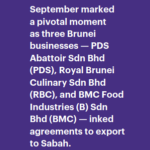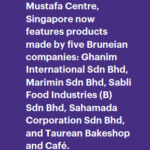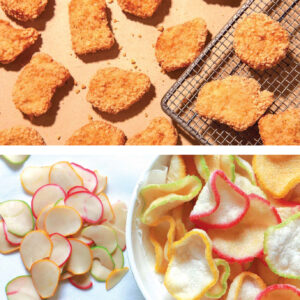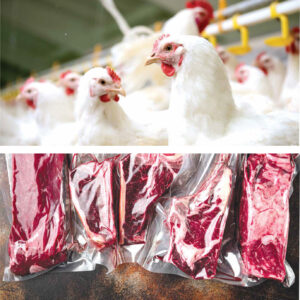Brunei Darussalam is actively advancing its commitment to not only ensure food security but also to meaningfully contribute to the nation’s gross domestic product (GDP) through agriculture.
Based on statistics from the Ministry of Primary Resources and Tourism (MPRT), the gross output of the agriculture and agrifood sector grew by 200 per cent over the past two decades. The gross output grew at an average rate of 5.6 per cent per annum, from BND192 million in 2002 to BND576 million in 2022.
The shift to modern farming techniques and animal husbandry systems, especially in the broiler industry, is one of the factors that contributed to this increase in gross output.
 However, the sector recorded a slight decrease of 2.3 per cent in its output performance from 2021 to 2022. This is primarily due to the decrease in output of the livestock industry.
However, the sector recorded a slight decrease of 2.3 per cent in its output performance from 2021 to 2022. This is primarily due to the decrease in output of the livestock industry.
The crop industry’s gross output decreased by 4.6 per cent from BND61.1 million in 2021 to BND58.28 million in 2022. Meanwhile, the livestock industry’s gross output in 2022 stood at BND348.5 million, a decrease of almost four per cent from the previous year.
The agrifood sector however saw an increase of 1.3 per cent from BND166.7 in 2021 to BND168.9 in 2022, mainly contributed by the increased production of food and beverage commodities.
The MPRT acknowledges that efforts to boost the country’s food production in recent years faced challenges due to global issues such as the COVID-19 pandemic, geopolitical conflicts and economic uncertainties. These challenges led to labour shortages, increased logistics costs, and higher expenses for crucial agricultural inputs including fertilisers and animal feed, primarily dependent on imports.
Despite obstacles faced by the agriculture and agrifood sector in 2022, there has been a notable upward trajectory in the gross output value for the agricultural industry, spanning livestock, crops, and paddy sectors in the past three years.
The industry’s value surged from BND323.61 million in 2020 to BND406.79 million in 2022, reflecting a substantial 26.7 per cent increase.
Growing presence in international markets
Brunei has achieved significant milestones in the food sector the past few years, particularly in expanding its presence in the export market. Bruneian-made products, sourced from primary resources, successfully made their way to various countries notably within the region. In the past, the country has exported various agricultural products including musk melon. As a new exporter of eggs to Singapore, Brunei successfully completed a shipment of 300,000 eggs in February 2022.
Meanwhile, September marked a pivotal moment as three Brunei businesses — PDS Abattoir Sdn Bhd (PDS), Royal Brunei Culinary Sdn Bhd (RBC), and BMC Food Industries (B) Sdn Bhd (BMC) — inked agreements to export to Sabah.
 These ventures into the Sabah market involved key agreements, such as a distributorship deal between PDS and Jetsin Sdn Bhd for PDS processed meat products, and a distribution agreement between BMC and Jetsin for BMC’s non-canned processed meat and corned beef.
These ventures into the Sabah market involved key agreements, such as a distributorship deal between PDS and Jetsin Sdn Bhd for PDS processed meat products, and a distribution agreement between BMC and Jetsin for BMC’s non-canned processed meat and corned beef.
Further agreements covered the distribution deal between BMC and Moh Heng Sdn Bhd for BMC and TGT Sdn Bhd corned beef products, along with an MoU between RBC and Jetsin for the supply of RBC frozen food products.
In September 2023, the first export of Bruneian-made products to Mustafa Centre in Singapore was announced by the Brunei Economic Development Board (BEDB) through Darussalam Enterprise (DARe). Prior to this, DARe facilitated a product sampling session while also aiding in price negotiations between Mustafa Centre and local exporters.
Mustafa Centre now features products made by five Bruneian companies: Ghanim International Sdn Bhd, Marimin Sdn Bhd, Sabli Food Industries (B) Sdn Bhd, Sahamada Corporation Sdn Bhd, and Taurean Bakeshop and Café.
 The export initiative was the result of efforts by DARe and the MPRT to facilitate the access of Bruneian products to international markets. It represents a significant step forward in the continued growth and partnership between Brunei and Singapore, as well as the international recognition of Bruneian-made products.
The export initiative was the result of efforts by DARe and the MPRT to facilitate the access of Bruneian products to international markets. It represents a significant step forward in the continued growth and partnership between Brunei and Singapore, as well as the international recognition of Bruneian-made products.
Sustainable stewardship
In addition to advancing the food sector industry, the MPRT places a significant focus on addressing the needs and interests related to the development and conservation of forest resources.
The Forestry Department, under the ministry’s purview, remains dedicated to ensuring the continuous development, protection, and conservation of the country’s forest resources. This commitment aligns with the principles of sustainable development, supporting the implementation of the “green protocol” initiative outlined in Brunei Darussalam National Climate Change Policy. Furthermore, the department actively organises workshops to empower and foster the growth of home-based agarwood businesses, locally known as kayu gaharu.

